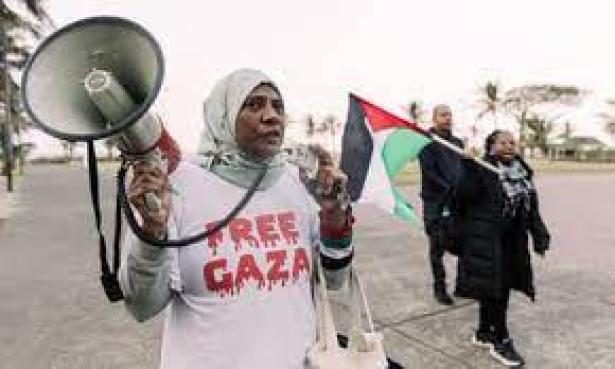In these last nine months, we have seen a carefully orchestrated and systematic war aimed at depriving Palestinians of our land and basic right to dignity: more than 40,000 Palestinians have been killed, our journalists have been murdered and hospitals destroyed, and children have been the primary victims of this assault. The international criminal court has indicated that many of these actions constitute war crimes.
However, in the west, if you were to turn on the news or read mainstream papers, you would probably see continual regurgitation of lies from Israeli officials, with no mention of the 200 Palestinians murdered every day, no mention of Palestinians using animal feed as food as they slowly starve, and no mention of the children trapped under rubble – in fact, many outlets refer to Palestinian children as “minors” to downplay the acts of violence perpetrated by the occupation.
The disturbing pattern is clear: there is a widespread silencing of Palestinian voices. Despite being at the center of what experts, global leaders and the masses have called a genocide, Palestinians find ourselves pushed to the periphery of discussions about our own futures, land and lives. The erasure occurs in media coverage, political negotiations, and even within activist spaces.
The US and western media disproportionately emphasize Israeli death, but for Palestinians the news seems to forget historical context, colonialism and the fact that Palestinians did not magically become refugees on their own. If Palestinians are presented as inherently violent beasts in a man-made cage, then our slaughter can be justified to the west. Palestinian children “die”, while Israeli children are “killed”. Look to the writers of the pieces – if you see “Israel-Hamas War” you can undoubtedly recognize it was not written by a Palestinian.
Disparities between Palestinian voices and others in media are abundantly clear. On CNN, media appearances by Israeli officials outnumber those of Palestinian voices by at least four to one. When Palestinians, or pro-Palestinians, do rarely appear on the news, they are questioned, asked for evidence and interrogated even as they are simultaneously asked to condemn Hamas’s October attack on Israel after 10 months of watching our children die in the streets.
After the World Central Kitchen was targeted, the family of journalist Wael al-Dahdouh murdered, and 355 bullets shot at six-year-old Hind Rajab, according to an investigation by Forensic Architecture, I expected Palestinians to have the opportunity to speak to the world. The children of Gaza even hosted their own press conference in front of mangled bodies to beg for basic humanity. It should have received prime-time coverage, but didn’t.
Time and again, US lawmakers and media talk to the perpetrators of mass violence, even inviting Benjamin Netanyahu to speak to Congress. Yet when Palestinians or Palestinian Americans try to give our opinions on peace plans, share our narrative on the political conflict, or even ask for as much airtime as pro-Israel voices, we are often met with silence or complete rejection. It seems that the parameters of Palestinian voices are confined to footage of the dead accompanying crying voices.
The silencing of Palestinians is equally evident in political spheres. As world leaders discuss potential paths to peace, Palestinians themselves are absent from the negotiating table. Joe Biden and other western leaders seem to operate under the misguided notion that peace can be achieved without directly engaging with Palestinians or addressing the root cause of this violence: the occupation. The US president says he is pushing for a two-state solution; how will that work when it never has? In fact, many Palestinians, like myself, advocate for a single state where everyone, regardless of ethnicity or religion, can see freedom in every direction.
Yet those asked to broker “peace” are removing the Palestinian Authority from our lands in East Jerusalem and even deny our existence entirely. Biden continues to see Hamas as the obstacle to peace, even as the Israeli prime minister says he will not accept a ceasefire to end the war.
How can any lasting resolution be reached when those affected by the violence are excluded from conversation? When those murdering us are asked to decide our future for us? The future of Palestine cannot be decided without Palestinians.
These patterns of exclusion and selective representation raise profound questions about the value placed on Palestinian lives and experiences. Why is a Palestinian perspective only appreciated when it falls in line with western imperialism? At what point does Palestinian life hold value so that our opinions matter? When establishment outlets downplay overwhelming Palestinian deaths while spotlighting comparatively few Israeli losses, they propagate an illusion that violence is mutual rather than one-sided domination.
Without understanding Palestinians’ humanity or the conflict’s true power dynamic, Americans broadly tolerate our government’s complicity in oppression. Palestinians must be granted the space to critique the actions of those responsible for the death of our people without facing accusations of extremism. We are entitled to whatever vocabulary we choose to describe the evil that has claimed so many of us.
Paradoxically, our voices are most aggressively silenced when they have never been more urgent. If Palestinians do nothing we are killed, houses are demolished and the world looks away. Any way in which we fight back is condemned. Social media platforms such as Meta have suppressed pro-Palestinian content, news sources rely on Israeli sources to “accurately” depict the violence Israel inflicts, and politicians speak of peace while being the ones to actively deny this genocide. Palestine is slowly being wiped from existence. This is not hard to see; simply type “Palestine map” on Google, and you will see differences over time. But Palestinians are not going anywhere, and we must be given the platform to discuss our oppression.
-
Ahmad Ibsais is a first-generation Palestinian American, law student and poet who writes the newsletter State of Siege


Spread the word